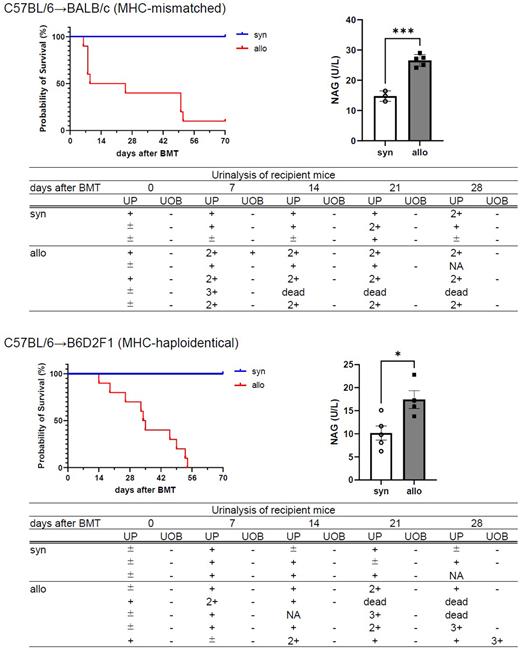Abstract
Acute graft-versus-host disease (aGVHD) is a life-threatening complication of allogeneic hematopoietic cell transplantation (allo-HCT). The skin, liver, and gastrointestinal (GI) tract are widely considered the main target organs of aGVHD, whereas the kidney is not widely recognized as a target organ. Clinical and preclinical studies suggest that the kidney may be targeted by allogeneic donor T cells, and acute kidney injury (AKI) is a relatively frequent complication of allo-HCT. However, renal biopsy is rarely performed in the early phase of allo-HCT, making it difficult to identify the cause of AKI. Here, we tested the hypothesis that the kidney is a target for aGVHD by determining whether allogeneic donor T cells directly attack renal endothelial or epithelial cells in murine models of aGVHD. To avoid potential confounding nephrotoxic effects, our models did not use calcineurin inhibitor-based aGVHD prophylaxis.
We first tested our hypothesis using an MHC-mismatched model of aGVHD. Briefly, BALB/crecipients were lethally irradiated and transplanted on day 0 with 5x106 bone marrow (BM) and 0.5x106 CD90.2+ splenic T cells from either syngeneic BALB/c or allogeneic MHC-mismatched C57BL/6 (B6) donors. On day 14 after HCT, urinary protein and N-acetyl-β-D-glucosaminidase (NAG), a marker of tubular injury, were elevated in allogeneic recipients. Similar results were obtained using an MHC-haploidentical B6 into B6D2F1 model and an MHC-matched multiple minor antigen mismatched B6 into C3H.sw model. Renal histopathology in an MHC-mismatched model (B6 into BALB/c) showed peritubular vasculitis as well as donor-derived H-2Kb positive CD3+ T cells in the glomerulus, peritubular capillaries, interstitium, and perivascular areas of allogeneic recipients. These data suggested that donor T cells directly infiltrated the kidneys.
Next, we examined the characteristics of the T cells infiltrating the kidney using flow cytometry. Both donor-derived CD4+ and CD8+ T cells were significantly more abundant in the allogeneic group. These increased T cells demonstrated significantly elevated surface markers of activation (CD69) and exhaustion (PD-1 and Tim-3) in allogeneic animals. In addition, secretion of proinflammatory cytokines (TNF-α and IFN-γ) and cytotoxic proteins (granzyme B) was increased by renal infiltrating donor T cells in allogeneic recipients.
To determine whether allogenic T cells directly damaged kidneys, the expression of neutrophil gelatinase-associated lipocalin (NGAL), a marker of acute kidney injury, and Elafin, a marker of cutaneous GVHD, were measured. Both were increased in the kidneys of allogeneic animals suggesting donor T cells directly damage kidneys.
To confirm whether allogeneic donor T cells directly attack renal cells, we performed an in vitro cytotoxic T lymphocyte (CTL) killing assay using alloreactive T cells as effector cells and renal cells as targets. BALB/c or B6-derived T cells were stimulated with lethally irradiated syngeneic or allogeneic antigen-presenting cells. These activated T cells were then co-cultured with BALB/c-derived renal endothelial or proximal tubular epithelial cells. Apoptotic (TUNEL-positive) cells were increased in both renal endothelial and proximal tubular epithelial cells cultured with alloreactive T cells.
These studies demonstrated that donor T cells directly attack renal endothelial and tubular epithelial cells and mediate kidney-specific aGVHD after allo-HCT. Thus, our data supports the growing body of literature suggesting that the kidney is also an aGVHD target organ. Elucidating kidney-intrinsic mechanisms of aGVHD may lead to improved strategies for reducing renal dysfunction following allo-HCT.
Disclosures
Ishizawa:Pfizer: Honoraria; SymBio: Honoraria; Sawai: Honoraria; Sanofi: Honoraria; Janssen: Honoraria; Ono: Honoraria; Chugai: Honoraria; Micron: Consultancy; IQVIA: Consultancy, Research Funding; Kyowa Kirin: Consultancy; Otsuka: Research Funding; AbbVie: Research Funding; Novartis: Research Funding; ZENYAKU: Research Funding.
Author notes
Asterisk with author names denotes non-ASH members.


